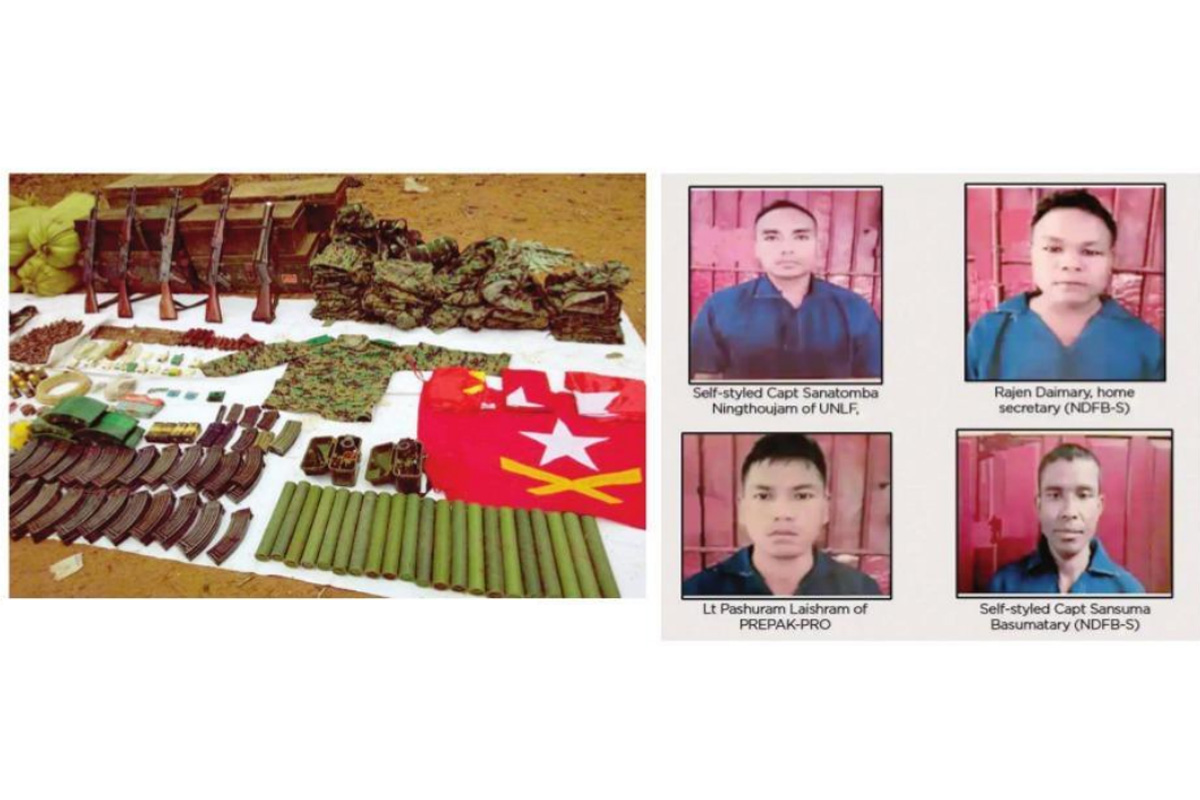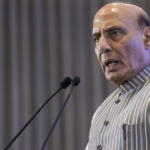
SOURCE: The Statesman
As the world struggles to contain the Covid-19 pandemic, the virus has apparently got India a security benefit. In a rare move on 15 May, Myanmar handed over 22 rebels from Assam and Manipur who were operating from jungles across the border. A source in the Special Investigation Team in Manipur said that the rebels had been quarantined at the 7 Manipur Rifles camp in Imphal.
“7 MR has a quarantine centre within the camp where the rebels have been housed,” said the source. If protocol is to be followed, the extradited men could be kept quarantined for two weeks before the law takes its course. State authorities, however, refused to confirm whether they were handed over due to the pandemic but that is what at least one rebel group claims.
A day after news of the deportation arrived, the Revolutionary People’s Front came out with a statement of clarification. Issued by the organisation’s publicity secretary Roben Khuman, it said that the deportation was due to the Covid-19 pandemic and not a diplomatic success for India.
The statement said it wasn’t enhanced intelligence or defence cooperation between Myanmar and India but merely a result of the Covid-19 pandemic.
Myanmar has a tradition of releasing prisoners on their New Year which falls in April, the statement said, and this year there was a higher number of releases due to the pandemic.
The statement acknowledged the move of the Myanmarese government and said that the Indian government must also emulate such actions, so that the pandemic can be fought collectively and effectively.
Unlike India, Myanmar has been tackling Covid-19 systematically, the statement said. The rebel leaders were brought in a special Indian Air Force plane that landed first in Imphal and then flew to Guwahati.
Twelve of them are members of Manipur’s United National Liberation Front, People’s Revolutionary Party of Kangleipak (Progressive), Kanglei Yawol Kan-na Lup and People’s Liberation Army of Manipur.
The rest are members of Assam’s National Democratic Front of Bodoland (NDFBS) and Kamtapur Liberation Organisation. Some prominent names among the deported included NDFB-S’ selfstyled home secretary Rajen Daimary, Sanatomba Ningthoujam of UNLF and Pashuram Laishram of Prepak (Pro). The cadres were captured when their camps were busted in Myanmar’s northern region.
Reported early last year, a joint operation was conducted under the code name “Operation Sunrise” by the Indian Army and Myanmar military.
It was the first time Myanmar had cooperated with India in terms of an operation to flush out militants using their soil as a base.
Apart from the Indian Army, Assam Rifles also took part in the operation. According to media reports, last year the Myanmar military and Indian Army carried out a three week-long coordinated action in their respective border areas and busted several militant groups operating in Manipur, Nagaland and Assam.
The first phase target of “Operation Sunrise” was the Myanmar-based insurgency group Arakan Army, an outfit opposing the Kaladan multi-modal transit transport project. In the second phase, both armies busted camps of Kamtapur Liberation Organisation, the NSCN (Khaplang), the United Liberation Front of Assam (I) and the National Democratic Front of Boroland. During the two-phased operation, at least six dozen terrorists belonging to multiple groups and factions were nabbed while several camps were destroyed.
The India-Myanmar joint operation was aimed at cross-border armed groups that were impacting both countries. Considered a huge diplomatic breakthrough, India’s neighbour Myanmar had usually responded halfheartedly in the past to any common military response against Indian insurgents based in their country.
Though a good number of joint operations had been conducted, there hadn’t been any major success.
Such exercises would be halted mid-way with no reports of any camps busted nor any militant captured. North-east’s militants have camps in the jungles of Myanmar bordering India and they operate from those hideouts to carry out their agenda in the region.
Though Myanmar’s soil has been used by such groups, mainly from Nagaland and Manipur, for a long time, it was the first instance that the Myanmar military, Tatmadaw, acted on India’s request and handed over insurgents.
The development no doubt indicates an increase in engagement of India with its eastern neighbour. The two country’s relations have been historically cordial with India playing the role of an elder brother.
Things had gone through some hiccups in the last decade though, mainly during Myanmar’s transition period from 2011- 2015, in which the neighbour had expected more intervention and influence from India.
During that period, there were a series of political, economic and administrative reforms undertaken by the military-backed government in Myanmar. Among other things, they included the release of pro-democracy leader Aung San Suu Kyi from house arrest and subsequent dialogues with her, establishment of the National Human Rights Commission, general amnesties for more than 200 political prisoners, institution of new labour laws that allowed labour unions and strikes, relaxation of press censorship, and regulations of currency practices.
This recent development of deporting North-eastern rebels indicates that Myanmar is serious about not allowing its soil to be used by insurgents to wage war against India. Given the historical relations, Myanmar also sees that it cannot avoid India on socio-political and economic fronts.
It may be mentioned here that one of the largest rebel militant organisations, the National Socialist Council of Nagaland (IM), is part of an ongoing peace process that is likely to conclude soon. Assam’s Ulfa too has been on the path of peace. Manipur’s UNLF supremo RK Meghan was released from jail in November 2019 and is back in his home state.
Other rebel groups in Manipur like the KNO and UPF are under suspensions of operation and in the process of dialogue. Meanwhile, the NSCN (Khaplang) has signed peace agreements with the government in Myanmar. Myanmar shares a 1,640-km border with India.
Over 50 insurgent groups have camps there and operate through the porous border between the two countries. Since early 2019, the Myanmar government has been actively cooperating with India to crack down on North-east insurgents and take full control of those areas.
The impact of this recent development will be felt in the North-east. Most importantly, it could usher in a new dawn of peace in the region.
The economic and political scenario is likely to see a change, and that augurs well for India’s Act East Policy.
The writer is a freelance journalist based in Imphal.
https://defencenewsofindia.com/22-rebels-deported-by-myanmar-is-a-welcome-development-for-peace-in-the-region/






